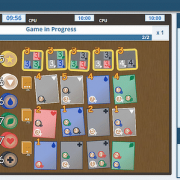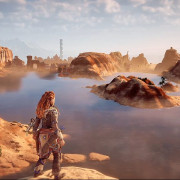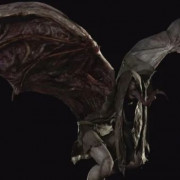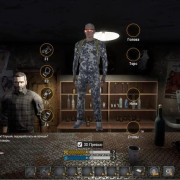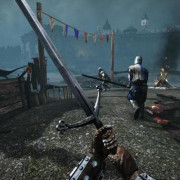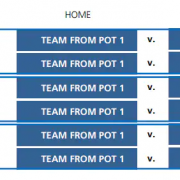City 17
Содержание:
Gallery
| The following is a Work in Progress as it is in the middle of an expansion or major revamping. |
| You are welcome to assist in its construction by editing it as well. However, do not make major changes before consulting the community, since the related editors probably set up guidelines for the page construction. |
Pre-release
Concept art
Early City 17 concept art.
Ditto.
Electrical props.
An early rough sketch of City 17 as a more decayed and dirty place.
Ditto.
A ruined City 17 building.
A City 17 attic.
The Citadel among skyscrapers.
Concept art for the Combine Smart Barrier near destroyed buildings.
Destroyed buildings.
A skyscraper towering over a building with a dome, possibly early Skyscraper and Overwatch Nexus.
A destroyed City 17 skyscraper.
Concept art for a Breencast device in the City 17 Trainstation.
Ditto.
Church in City 17.
Damaged library.
The Citadel.
Ditto.
Combine Barricade concept art in the Combine Factories area.
Combine Smart Barrier concept art.
Combine door.
Concept art of Combine Door Towers.
Concept art of children working on an unidentified machine.
Ditto.
Children working in the , located in City 17.
Gordon arriving at the foot of the Citadel.
The Citadel.
Inside the Manhack Arcade.
Ditto.
The .
A train in City 17.
Shelter in the City 17 Trainstation.
Inside the City 17 Trainstation.
Ditto.
Vorti-Cell concept art.
The very first Half-Life 2 menu background, featuring City 17.
A City 17 street, with a mixture of modern and traditional architectural designs.
- Main article:
Gallery
Alyx recovering from the train wreck.
A group of Zombies walking towards Gordon and Alyx.
Alyx fighting a Zombie.
Alyx fighting Zombies.
Dead Zombines and two Emitters in a Razor Train.
Alyx protecting herself from Gordon’s flashlight.
Maintenance room.
Small parking lot with an Antlion burrow.
Poison Headcrabs in a parking lot.
The same parking lot (slightly different) in a menu background map.
Collapsed ceiling and damaged cars.
Destroyed parking lot with Antlion burrows.
Ditto.
A flooded room.
The exit to the surface.
Alyx watching Kleiner through Breencast right after reaching the surface.
See also
- City 17 locations
| Preceded by N/A | Half-Life 2 story arc journey (1) | Succeeded by Canals |
| Preceded by The Coast | Half-Life 2 story arc journey (2) | Succeeded by The Outlands |
| Preceded by N/A | Half-Life 2 original storyline (1) | Succeeded by Canals |
| Preceded by Arctic locations | Half-Life 2 original storyline (2) | Succeeded by N/A |
| Locations | |
|---|---|
| Aperture Science | Borealis • Employee Daycare Center • Enrichment Center • Enrichment Shafts: Co-op Test Shaft / Test Shaft 09 • Extended Relaxation Annex • Extended Relaxation Center • Central AI Chamber • Hub • Incinerator Room • Neurotoxin Generator • Testing tracks: GLaDOS’ testing track (Portal) / GLaDOS’ testing track (Portal 2) / Wheatley’s testing track / Cooperative Testing Courses • Turret Manufacturing |
| Black Mesa | Advanced Biological Research Lab • Alien Quarantine Labs • Area 8 Topside Dormitories • Biological Waste Processing Plant • Black Mesa Air Control • Black Mesa desert • Black Mesa Medical Lab • Black Mesa Research Facility • Black Mesa Sectors: Sector A Training Facility / Sector B Coolant Reserve / Sector C Test Labs / Sector D Administration / Sector E Biodome Complex / Sector F Lambda Complex / Sector G Hydro Electric • Black Mesa South Access • Black Mesa Transit System • Freight Yard • Gamma Labs • Level 3 Dormitories • Section A-17 Prototype Labs • Topside Motorpool • Waste Processing Area 3 |
| Combine | APC garage • Citadel • Citadel Core • City 8 • City 11 • City 12 • City 13 • City 14 • City 15 • City 16 • City 17 • City 24 • City 27 • City 17 Trainstation • Combine Overworld • Depot • Gate 5 • Nova Prospekt • Overwatch Nexus • Technical Trainstation • The Vault |
| Resistance | Alyx’s Apartment • Black Mesa East • Bridge Point • Dock 137 • Kleiner’s Lab • Lighthouse Point • New Little Odessa • Radio Tower • Ravenholm • Russell’s Lab • Shorepoint Base • Station 6 • Station 7 • Station 8 • Station 9 • Station 12 • Station 21 • Underground Railroad • Victory Mine • Vortigaunt Camp • White Forest • The White Forest Inn |
| Other | Canals • City 17 Underground • Earth • Fairview Junction • The Coast • Hospital • Locations (cut) • Locations in the Half-Life universe • Moon • The Outlands • Quarantine Zone • Santego Military Base • St. Olga • The Wasteland • Xen |
Последствия взрыва:[]
Взрыв реактора тёмной материи повлекло за собой ещё более губительные последствия,нежели уничтожение жилого сектора. Разлом,созданный взрывом создал мощнейшие портальные штормы,породившие бреши в пространстве и времени. Портальные штормы,уничтожающие всё на своём пути,были замечены в округе,где располагался бывший Сити-17. Кроме того,разведывательный корпус Надзора Альянса сообщает,что подобного рода портальные штормы порождают некие дыры в другие вселенные. В закрытом секторе происходят и другие аномальные вещи,вроде остановки или ускорения времени,а также открываются неивзестные порталы. В них также были замечены существа из других измерений и даже некие гости из прошлого. Исходя из этих фактов можно сказать,что появление бойцов H.E.C.U тесно связано с открытием порталов. Этот феномен был назван Временным сдвигом.
Падение Сити-17,как главного штаба Альянса на Земле и одного из самых значимых городов,сильно пошатнуло власть режима. Когда новость об этом дошла до населения других городов,начались массовые беспорядки,возросло количество преступных группировок и формирование новых отделов Сопротивления во всех жилых точках. На борьбу с нарастающими повстанческими силами была задействована целая цепочка крупнейших отделов Надзора Альянса.
Восстание в Сити-17[]
Диверсия в Нова-Проспект подняла немалый ажиотаж,за которым последовала волна бунтов по многим городам с наименованием «Сити». Самое большое восстание произошло в Сити-17 и в нём были замешаны не только члены террористической группировки повстанцев,но и многие граждане,присоединившиеся к тотальному хаосу. Буквально уже через несколько часов после взрыва в Нова-Проспект,на улицах города были слышны первые выстрелы и появились первые жертвы. Для подавления бунта были задействованы не только сотрудники Гражданской Обороны,но и различные виды военной структуры Альянса. Силы Сопротивления нанесли удар по многим военным частям в Сити-17 и убили большое количество наших бойцов. На помощь городу из других городов и военных баз немедленно посмешило подкрепление,но было уже поздно. Когда было объявлено чрезвычайное положение и угроза реактору тёмной материи,оставалось лишь эвакуировать оставшихся солдат и администраторов. Уйти сумели немногие,а эвакуация длилась очень недолгое время,за которое были спасены выжившие сотрудники ГО и специальных войск Альянса,а также офицеры и администраторы. Взрывная волна и множественные портальные штормы также уничтожили все блокпосты и железнодорожные пути вокруг Сити-17. Сканирование местности после взрыва не дало точных результатов,однако признаков жизни так и не было обнаружено.
Цитадель Сити-17 (До уничтожения)
Behind the scenes
Alyx helpless without Gordon’s flashlight.
- This chapter is the first example of Alyx’s new co-op features and combat abilities. As she is the only protagonist equipped with a gun, Gordon having only the Gravity Gun (although he originally was to have no weapon at all), he has to help her killing enemies by aiming his flashlight at them in dark areas, otherwise she does not see them and thus cannot defend herself properly and could get herself killed. He can also throw objects at enemies, but Alyx will always be able to manage all the attacks on her own with a minimum of support from Gordon. She also cannot move in the dark if Gordon disappears with his flashlight turned off, and will call for him helplessly, in a scared tone.
- Gordon originally couldn’t operate the power boxes in Episode One and would have to wait for Alyx to do it. But developers removed this due to the fact that this exposed Alyx’s most robotic tendencies. Gordon would’ve had to let Alyx finish what she was doing first and then wait for her to work. This led to frustration. What developers learned is that in order for Alyx to be more reliable, she has to finish a task quickly and then move on.
- This chapter also first introduces the Zombine.
In completely dark sections, Zombies will tend to spawn faster if the flashlight is turned off.
In completely dark areas where the flashlight is the only source of illumination, the team found that they would often end up with grossly over-exposed views and the HDR parameters were to be modified. In particular, they drastically shrunk the region of the screen where the flashlight’s light is located, which is bigger in Half-Life and Episode Two. It permitted them to concentrate only on that area and thus increase the sense of claustrophobia.
In that chapter, the player is also forced to block Antlion burrows with cars in a collapsed parking lot, while Alyx helps him fight the Antlion, but without giving him any clues on how to block the burrows.
The elevator scene is one of the most tricky parts of the game for the inexperienced player. When Gordon and Alyx arrive at it, its power is down and has to be reactivated through a powerbox located at the other end of a big and completely dark room. When the power is turned on again, Zombies swarm the area, and Alyx and Gordon must bear a huge standoff while waiting for the elevator to come, mirroring scenes from previous games such as the teleport scenes at the end of Blue Shift or in the Half-Life 2 chapter Entanglement. The first iteration of this battle was originally very different. The space was larger, had water in it, and was not completely dark. The team cut water in favor of more Zombies, as Water is relatively expensive, performance-wise. The area was made smaller to ensure that the player would see the elevator and recognize the problem that needed to be solved before the fight starts. The team applied a completely dark setting in order to enhance tension and to leave the battle as a final test of the players’ low-light fighting skills, which had previously been developed over the course of the episode. Finally, they added a wire running along the ceiling from the elevator to the powerbox to give the player a guide as they familiarize themselves with the area.
The City 17 vista where Kleiner is seen on the Breencast after reaching the surface is intended to be «an explicit visual reward for surviving the elevator battle.»
Overview
Dilapidated tunnel with Ceiling Turrets with empty magazines.
Following the Combine invasion and the Seven Hour War, the City 17 underground was apparently no longer used and fell into serious disrepair. However, it is possible that Resistance members used the underground even before the rebellion, as there are numerous bodies to be found, only some of them being recently deceased.
After the destabilization of the Citadel, the underground becomes severely infested with Headcrabs and Zombies, as well as Antlions, who, following the collapse of the Combine’s defensive field (previously powered by the Citadel), start establishing a foothold in the city via the tunnels.
Because of the large number of Zombines in the underground, it is possible that the Combine were attacking Resistance members hiding there when Antlions and Xen wildlife were allowed access.
Features
The City 17 Underground mostly consists of underground parking lots, maintenance tunnels, and storage areas. All or most of these facilities are in serious disrepair and many are infested with Zombies and Xen wildlife. There are many storage rooms and lots, as well as sewage pipes. The passageways connecting other areas also contain handwheels to open gates.
Overview[edit]
Architectureedit
The Trainstation Plaza, under surveillance by Civil Protection units and equipment, with a «Breencast» monitor, which Doctor Breen uses to address City 17 citizens.
City 17 visually resembles a post-Soviet harbor city featuring mostly Eastern European architecture. It features architecture styles dating from pre-World War II neoclassicism, post-war classical designs, Soviet modernism, and post-Soviet contemporary designs.
Upon the Combine’s arrival on Earth, many new structures were constructed using their own style of architecture, with the possible intent of restricting Citizen movement throughout the city.[source?] This created a distinct aesthetic style for the city, of Eastern European architecture juxtaposed with the cold, monolithic Combine technology.
In addition, large screens were installed in several public areas to address Citizens regarding the Combine through Breencasts. At the heart of the city was the Citadel, a giant skyscraper which served as the hub of the Combine.
Designedit
The core of the city consisted predominately of wall-to-wall buildings, with blocks of clustered low-rises made out of a variety of old and new buildings. Soviet-style project apartment blocks also had a prominent appearance in the city. Under Combine rule, some city districts were divided into semi-isolated precincts and many residential buildings were used as accommodations for citizens. Conditions in such housings were typically poor and effectively bordering on slums, with very few luxuries and constant inspection and raids by Civil Protection. However, some city infrastructure, such as power plants, were maintained by the Combine, and electricity was made widely available from both traditional sources and Combine generators. The Combine themselves occupied some former government buildings, such as the Overwatch Nexus, to help keep control over the city.
The city was large enough to provide all necessary needs for the citizens before the Combine’s occupation. This is supported by the appearance of a hospital, several cafés and restaurants, office buildings, and underground city systems; much of said infrastructure was still relatively intact but disused.
The outskirts of City 17 featured industrial districts and additional project apartment blocks, most of which are seemingly considered off-limits to Citizens. The industrial districts are seen linked to the city via railway lines and canals.
As there was little emphasis in maintaining non-essential parts of the city, many areas of City 17 suffered from urban decay prior to the Citadel’s explosion.
Transportation systemsedit
A Combine Razor Train passes by a canal and residential apartments.
City 17’s transportation system had considerable variety. In addition to highways and city streets, City 17 included underground road tunnels that traveled beneath the city; during the Resistance uprising against the Combine, portions of the tunnel could be seen, badly damaged, with areas flooded with toxic substances. Several railway lines ran throughout the city, with at least two large train stations connecting City 17 to other Combine controlled cities. The Combine maximized the use of these transportation systems, developing ground-based APCs to patrol roads while utilizing pre-invasion trains and their own form of trains to transport citizens and goods in and out of City 17. The presence of unused tramways on a street also suggest that the city once provided tram services before the Combine rule.
A city canal containing hazardous materials.
A network of canals was also prevalent in and around City 17. Much of the inner city canals, however, were made defunct after the Combine’s draining of large bodies of water around City 17 left much of the area’s canal system dry. However, the industrial district canal systems remained usable, albeit shallower, with certain portions of the canals contaminated with .
Overview
Architecture
The Trainstation Plaza, under surveillance by Civil Protection units and equipment, with a «Breencast» monitor, which Doctor Breen uses to address City 17 citizens.
City 17 visually resembles a post-Soviet harbor city featuring mostly Eastern European architecture. It features architecture styles dating from pre-World War II neoclassicism, post-war classical designs, Soviet modernism, and post-Soviet contemporary designs.
Upon the Combine’s arrival on Earth, many buildings were augmented using their own style of architecture with the intent of restricting citizen movement throughout the city.[source?]
In addition, large television screens were installed in several public areas to address citizens regarding the Combine. At the heart of the city is the Citadel, a giant skyscraper which serves as the hub of the Combine.
Design
The core of the city consists predominately of wall-to-wall buildings, with blocks of clustered low-rises made out of a variety of old and new buildings. Under Combine rule, certain residential buildings in the city are used as accommodations for citizens. Conditions in such housings are typically seen as poor, with very few luxuries and constant inspection and raids by Civil Protection. However, some city infrastructure, such as power plants, are maintained by the Combine, and electricity is made widely available from both traditional sources and Combine generators. The Combine themselves occupied some former government buildings, such as the Overwatch Nexus, to help keep control over the city.
The city was large enough to provide all necessary needs for the citizens before the Combine’s occupation. This is supported by the presence of a hospital, several cafés and restaurants, office buildings, and underground city systems; most of which are still intact but abandoned.
The outskirts of City 17 features industrial districts and additional Soviet-style housing, most of which are considered off-limits to citizens. The industrial districts are seen linked to the city via railway lines and canals.
As there was little emphasis in maintaining non-essential parts of the city, many areas of City 17 suffered from urban decay prior to the Citadel’s explosion.
Transportation systems
A Combine Razor Train passes by a canal and residential apartments.
City 17’s transportation system had considerable variety. In addition to highways and city streets, City 17 includes underground road tunnels that traveled beneath the city; during the Resistance uprising against the Combine, portions of the tunnels could be seen, badly damaged, with areas flooded with toxic substances. Several railway lines run throughout the city, with at least two large train stations connecting City 17 to other Combine controlled cities. The Combine maximized the use of these transportation systems, developing ground-based APCs to patrol roads while utilizing pre-invasion trains and their own form of trains to transport citizens and goods in and out of City 17. The presence of unused tramways on a street also suggest that the city once provided tram services before the Combine rule.
A city canal containing hazardous materials.
A network of canals is also prevalent in and around City 17. Much of the inner city canals, however, were made defunct after the Combine’s draining of large bodies of water around City 17 left much of the area’s canal system dry. However, the industrial district canal systems remains usable, albeit shallower, with certain portions of the canals contaminated with .
References[edit]
Combine OverWiki has more images related to City 17.
- ↑ Half-Life 2
- ↑ Half-Life 2: Raising the Bar, page 166
- ↑ Half-Life 2: Raising the Bar, page 238
- ↑ WC map pack
- Breencast
- ↑ Half-Life 2: Raising the Bar
- The Half-Life 2 chapter Point Insertion
- ↑ Half-Life 2: Episode One
- ↑ Half-Life 2: Episode Two
- The Overwatch Voice in the Half-Life 2 chapter Point Insertion
- Half-Life 2 leak
- Half-Life 2: Raising the Bar, page 168
| Preceded byN/A | Half-Life 2 story arc journey (1) | Succeeded byCanals |
| Preceded byThe Coast | Half-Life 2 story arc journey (2) | Succeeded byThe Outlands |
| Locations | |
|---|---|
| Aperture Science | · · · · · · · · · · · · · s: · · |
| Black Mesa | · · · · · · · · Black Mesa Sectors ( ) · · · · · · · · · · · · |
| Combine | · () · · · · · · · · · · · · · |
| Quarantine Zone | · ( · · ) · · · · · · · · |
| Resistance | · · · · · · · · · · · · ( · · ) · · · · · |
| Xen | · |
| Other | · · · · · · · · · · |
| Black Mesa (cut) | · · · · · · |
| Combine (cut) | · · · · · |
| Resistance (cut) | · · |
| Other (cut) | · · · |
Overview
The food hall inside the trainstation.
This trainstation is not the only one in City 17, and probably not the most important. It is not very crowded and the tracks appear obstructed when Gordon goes back to its vicinity at the start of his escape from Kleiner’s Lab.
Under the main glass roof, several platforms receive Citizens from other cities coming in recycled human trains, while Wallace Breen welcomes them in one of his numerous Breencasts. There, Citizens are instructed by Metrocops to leave their luggage. City Scanners are flying around. After a turnstile, a corridor leads to the waiting room where the schedules are displayed (suggesting other similar cities exist, such as City 16, 15, 13, etc). After this follows a security checkpoint, with Metrocops. From there, three paths are possible: one leads to the Trainstation Plaza, the second leads to interrogation rooms where Gordon Freeman reunites with Barney Calhoun and Isaac Kleiner, and the third leads to the platform where Razor Trains leave to Nova Prospekt. The Plaza path leads to a corridor that then leads to the former main hall of the station, transformed into a food hall, where Citizens queue for their food packages at a Combine Dispenser. There, another Breencast is also playing. Another corridor leads to the Trainstation Plaza, where the same Breencast is broadcast on a screen attached to an obelisk at the center, facing the train station’s main facade.
Each road is blocked by Combine Barricade checkpoints, leading to different precincts and watched by cameras. A Combine Watchtower is also attached to one of the buildings. At the time of the City 17 uprising, the main trainstation entrance is sealed by Combine technology and the whole area is heavily damaged, with Combine Smart Barriers having destroyed most of the surrounding buildings.
Behind the scenes[edit]
- «One of the reasons that we liked Eastern Europe as a setting was that it represents the collision of the old and the new in a way that is difficult to capture in the United States. You go over there, and you have this collision between all of these things, the new architecture, the old architecture, the fall of communism…there’s a sense of this strongly-grounded historical place. We left out the Gothic themes associated with Prague and vampires and looked into a different aspect of the region.»
- ― Viktor Antonov
When responding to a question in a Reddit AMA about whether he researched any Eastern European cities for City 17, Viktor Antonov wrote that «it was based on childhood city Sofia», and that «it had mixed elements» from Belgrade and Saint Petersburg.
During the development of Half-Life 2, Valve made many reference photos of the larger Seattle area where Valve is based, including, among others: Airport Way S (for decrepit brick building textures), Macy’s on Pine Street (for the Manhack Arcade), an USCGC ship in the harbor as a reference for the Borealis, magnetic cranes in west Seattle and the Queen Anne radio towers for the antenna near the Manhack Arcade.
Appearances
A Zombine running at Alyx and Gordon with a grenade.
Half-Life 2: Episode One
After stabilizing the Citadel long enough to make their escape, Gordon Freeman and Alyx Vance become trapped in the underground after the Razor Train they are riding in derails and crashes. After battling hordes of Zombies, swarms of Antlions, and overcoming various other obstacles, Gordon and Alyx are able to locate an elevator, which they manage to power up and ride to the surface, escaping the hordes of Zombies. Almost arrived to the surface, they have to find a handwheel to unlock the final gate, after which they discover how much more City 17 is ravaged and that Isaac Kleiner took over the Breencast network to deliver vital information to the city’s inhabitants.
External links
| Preceded by N/A | Half-Life 2 story arc journey | Succeeded by Kleiner’s Lab |
| Preceded by N/A | Half-Life 2 original storyline(City 17 Trainstation) | Succeeded by Combine Factories |
| Locations | |
|---|---|
| Aperture Science | Borealis • Employee Daycare Center • Enrichment Center • Enrichment Shafts: Co-op Test Shaft / Test Shaft 09 • Extended Relaxation Annex • Extended Relaxation Center • Central AI Chamber • Hub • Incinerator Room • Neurotoxin Generator • Testing tracks: GLaDOS’ testing track (Portal) / GLaDOS’ testing track (Portal 2) / Wheatley’s testing track / Cooperative Testing Courses • Turret Manufacturing |
| Black Mesa | Advanced Biological Research Lab • Alien Quarantine Labs • Area 8 Topside Dormitories • Biological Waste Processing Plant • Black Mesa Air Control • Black Mesa desert • Black Mesa Medical Lab • Black Mesa Research Facility • Black Mesa Sectors: Sector A Training Facility / Sector B Coolant Reserve / Sector C Test Labs / Sector D Administration / Sector E Biodome Complex / Sector F Lambda Complex / Sector G Hydro Electric • Black Mesa South Access • Black Mesa Transit System • Freight Yard • Gamma Labs • Level 3 Dormitories • Section A-17 Prototype Labs • Topside Motorpool • Waste Processing Area 3 |
| Combine | APC garage • Citadel • Citadel Core • City 8 • City 11 • City 12 • City 13 • City 14 • City 15 • City 16 • City 17 • City 24 • City 27 • City 17 Trainstation • Combine Overworld • Depot • Gate 5 • Nova Prospekt • Overwatch Nexus • Technical Trainstation • The Vault |
| Resistance | Alyx’s Apartment • Black Mesa East • Bridge Point • Dock 137 • Kleiner’s Lab • Lighthouse Point • New Little Odessa • Radio Tower • Ravenholm • Russell’s Lab • Shorepoint Base • Station 6 • Station 7 • Station 8 • Station 9 • Station 12 • Station 21 • Underground Railroad • Victory Mine • Vortigaunt Camp • White Forest • The White Forest Inn |
| Other | Canals • City 17 Underground • Earth • Fairview Junction • The Coast • Hospital • Locations (cut) • Locations in the Half-Life universe • Moon • The Outlands • Quarantine Zone • Santego Military Base • St. Olga • The Wasteland • Xen |
| Vehicles, vessels and transportation | |
|---|---|
| Black Mesa transportation | Black Mesa SUV • Black Mesa Transit System • Black Mesa truck |
| Black Ops vehicles | AH-64 Apache • M35 cargo truck • V-22 Osprey (cut) |
| HECU vehicles | AH-64 Apache • F-16 Fighting Falcon • M1A1 Abrams • M2A3 Bradley • M35 cargo truck • V-22 Osprey |
| Combine vehicles | Advisor Platform • AirEx Truck (cut) • Armored Personnel Carrier • C-130 (cut) • Combine SWAT Truck (cut) • Hunter-Chopper • M2A3 Bradley (cut) • Merkava (cut) • Razor Train • School Bus (cut) • V-22 Osprey (cut) |
| Resistance vehicles | Airboat • Borealis (cut) • C-130 (cut) • Jalopy (cut) • Jet Ski (cut) • Mil Mi-8 • Muscle Car • Scout Car • Submarine (cut) • V-22 Osprey (cut) |
| Trainstations | City 17 Trainstation • Depot • Technical Trainstation |
| Other | Borealis • Chevrolet Caprice (cut) • Digger (cut) • F-117 Nighthawk (cut) • Ford F-250 (cut) • GMC Vandura (cut) • Rail transport • Road transport |
Gallery
Concept art
Concept art of the inside, made on a modified version of the stenographer’s chasm building.
Ditto, seen through the broken glass roof.
Ditto.
Ditto.
Another inside view, with Razor Trains and people.
Shelter on the Trainstation Plaza.
Pre-release
The back/side of the trainstation seen from the Combine Factories area.
Other view of the first facade version.
In front of the first version.
The Terminal Plaza, known today as the Trainstation Plaza, in one of the earliest Half-Life 2 screenshots, in the map «», showing the Metrocops’ and Citizens’ old skins. This image is still on the Half-Life 2 cover art as of today, even though the map and the NPCs’ skins were cut from the retail version. The first Half-Life 2 trailer features other signs on the building on the left.
The Terminal Plaza in the same map.
Rebels near the Terminal Plaza, in the same map.
Temporary American textures and Combot in an earlier version of the same map, as seen in the first Half-Life 2 trailer.
Combots in an earlier version of the same map, as seen in the first Half-Life 2 trailer.
The first known APC model and Metrocops beating Citizens in the same map, as seen in the first Half-Life 2 trailer.
Very basic brush train bringing Gordon to the trainstation in the playable Beta.
The food hall with direct access to the plaza in the playable Beta.
The tracks behind the trainstation, with the Citadel visible.
Metrocops at the checkpoint between the waiting hall, the Trainstation Plaza, the Nova Prospekt platforms, and the interrogation rooms.
Retail
Railway opposite the trainstation.
Main platforms from afar. As seen in early screenshots and the playable Beta, the Citadel originally appeared in the background.
Ditto.
Citizens on a train on its way to the trainstation. This is the first real world thing Gordon sees when he wakes up.
City Scanner welcoming Gordon to a brand new dystopian world.
The first Breencast seen by Freeman.
Stationed locomotives in the trainstation.
Sweeping Vortigaunt.
The waiting hall.
Schedule found in the waiting hall. It also appears in Left 4 Dead, in the Blood Harvest campaign, where it can be found in the Train Station chapter.
Metrocops at the checkpoint between the waiting hall, the Trainstation Plaza, the Nova Prospekt platforms, and the interrogation rooms.
Razor Trains on the Nova Prospekt platforms.
Refugee having his relocation questioned in an interrogation room.
Interrogation chair in an interrogation room.
Barney reveals himself.
Old friends reunite.
A Combine ration dispenser in the trainstation food hall.
The main facade columns on the Trainstation Plaza.
City Scanner following a Citizen.
A Citizen passing by on the Trainstation Plaza.
The main facade as seen from the Trainstation Plaza.
Ditto.
Ditto.
The Trainstation Plaza before the uprising.
The back of the trainstation as seen at the start of Gordon’s escape.
Metrocops shooting at Gordon Freeman at the back of the trainstation at the start of his escape.
Rebels taking down the Trainstation Plaza Breencast device during the Uprising.
Combine Smart Barriers on the Trainstation Plaza.
The sealed trainstation entrance in the Trainstation Plaza during the uprising.
